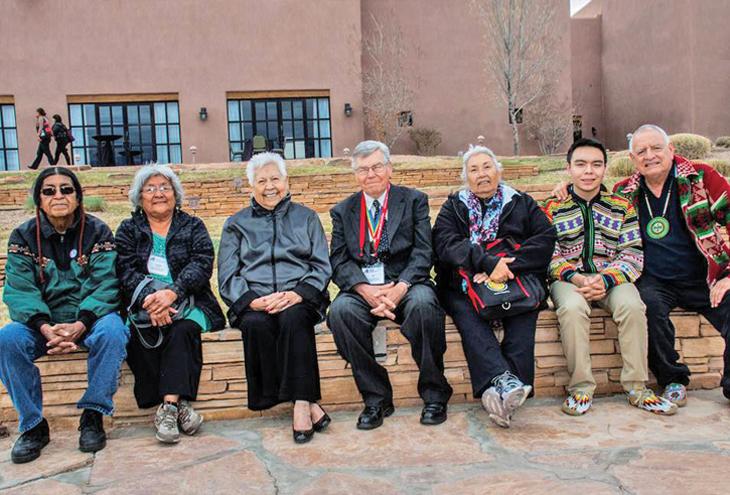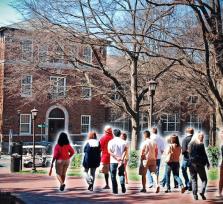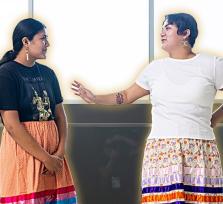Meet the Council of Elders
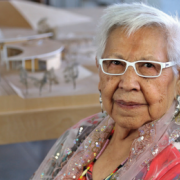
DR. HENRIETTA MANN, Tsitistas (Southern Cheyenne), is the council’s sole remaining founding member. Mann was recently elected to the National Academy of Education, a distinction merited by outstanding scholarship in the field. She is the founding president of the Cheyenne and Arapaho Tribal College and the first to occupy the Katz Endowed Chair in Native American Studies at Montana State University, where she is professor emerita. In 2008 she received the Lifetime Achievement Award from the National Indian Education Association. The Native American Student Advocacy Institute honored Mann with its inaugural Lifetime Achievement Award in 2013, and has since created the Dr. Henrietta Mann Leadership Award. In 2014, Money magazine named her a Money Hero for “extraordinary work with the Cheyenne and Arapaho Tribal College in improving the financial well-being of others.”
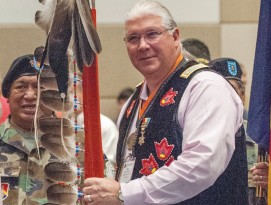
DR. BRET BENALLY THOMPSON, Anishinaabe, White Earth Band of Ojibwe, assisted AISES elders during conferences for 22 years before he was appointed to the council himself in 2015. He enlisted in the Army National Guard when he was 18, and served as both an active-duty and reserve officer. His civilian career included a stint as deputy sheriff in Texas and EMT in Colorado. At age 40 he decided to pursue a medical degree, and completed a family medicine residency in Alaska. He met his wife, Antoinelle, when they were students attending their first AISES National Conference. Benally Thompson is energized by supporting his tribe’s ceremonies and participating in powwows as a traditional dancer. For him, serving on the council means he’s following in the footsteps of his grandfather Horace Axtell, who asked Benally Thompson to take his place.
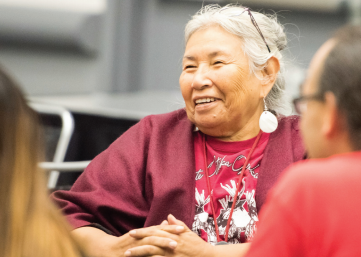
FAITH SPOTTED EAGLE, Ihanktonwan, is a Dakota language teacher. She earned a master’s in guidance and counseling, and has had a remarkably varied career as a high school counselor, teacher, and principal; manager of human services and youth programs; Indian child welfare worker; organizational development consultant; peacemaker/ mediator; community college instructor; PTSD therapist; and community activist. She worked with the groundbreaking Coalition of Indian Controlled School Boards in Denver and was at the forefront of addressing repatriation issues in her homeland. She is the first Native American to cast an electoral vote for president, a leader in the fight against the Keystone XL pipeline, and a 20-year member of the traditional Brave Heart Society. Spotted Eagle works in communities with her Healing from Red Rage model, which has been widely used in the U.S. and Canada.
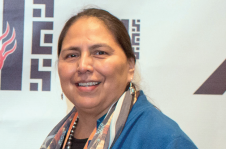 ANTOINELLE BENALLY THOMPSON, Navajo, has been a council member since 2015. She earned a BS in biology, worked for Northern Navajo Medical Center’s Health Promotion Disease Prevention Program in Shiprock, N.M., and then developed the Fond du Lac Tribal Injury Prevention Program in Cloquet, Minn. She and her husband, Bret, live in Wisconsin where she is a stay-at-home mom raising their two daughters. Benally Thompson enjoys interacting with the younger generation at AISES events, and she always reminds students that the elders are there for them all year long, not just at conferences.
ANTOINELLE BENALLY THOMPSON, Navajo, has been a council member since 2015. She earned a BS in biology, worked for Northern Navajo Medical Center’s Health Promotion Disease Prevention Program in Shiprock, N.M., and then developed the Fond du Lac Tribal Injury Prevention Program in Cloquet, Minn. She and her husband, Bret, live in Wisconsin where she is a stay-at-home mom raising their two daughters. Benally Thompson enjoys interacting with the younger generation at AISES events, and she always reminds students that the elders are there for them all year long, not just at conferences.
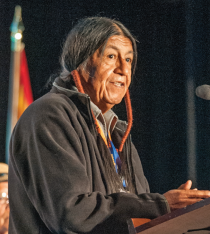 STAN LUCERO, Laguna Pueblo, has served on the council for 12 years. After focusing on business in college, Lucero dedicated much of his career to his tribe’s economic development. For more than 30 years he served on the tribal council in various capacities, and subsequently taught the Keres language. A Vietnam marine veteran, Lucero survived the fiercely fought Tet Offensive. Lucero is currently awaiting a kidney transplant. For him, “being seriously ill doesn’t mean it’s time to give up on life, but rather it’s a time to adapt because life is too beautiful to give up.”
STAN LUCERO, Laguna Pueblo, has served on the council for 12 years. After focusing on business in college, Lucero dedicated much of his career to his tribe’s economic development. For more than 30 years he served on the tribal council in various capacities, and subsequently taught the Keres language. A Vietnam marine veteran, Lucero survived the fiercely fought Tet Offensive. Lucero is currently awaiting a kidney transplant. For him, “being seriously ill doesn’t mean it’s time to give up on life, but rather it’s a time to adapt because life is too beautiful to give up.”
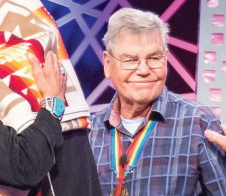 DR. JAMES MAY, United Keetowah Band, joined the council in 2016 and previously served on the Board of Directors as treasurer. May earned a BS in civil engineering, an MBA, and a PhD in library and information science. He is chair of the Native American Public Television Board. May was an officer in the Navy Civil Engineer Corps, co-founded a publishing company that later became Macmillan Information Corp., and served as the first community technology coordinator at the Smithsonian’s National Museum of the American Indian. His first academic appointment was directing the Center for Communication and Information Research at the University of Denver. May was the first dean of instruction and founding dean of science, technology, and information resources at California State University at Monterey Bay.
DR. JAMES MAY, United Keetowah Band, joined the council in 2016 and previously served on the Board of Directors as treasurer. May earned a BS in civil engineering, an MBA, and a PhD in library and information science. He is chair of the Native American Public Television Board. May was an officer in the Navy Civil Engineer Corps, co-founded a publishing company that later became Macmillan Information Corp., and served as the first community technology coordinator at the Smithsonian’s National Museum of the American Indian. His first academic appointment was directing the Center for Communication and Information Research at the University of Denver. May was the first dean of instruction and founding dean of science, technology, and information resources at California State University at Monterey Bay.
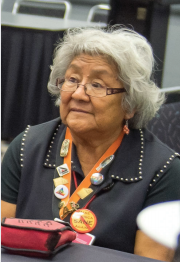 CECELIA LUCERO, Acoma Pueblo, was only the second member of her tribe to graduate from college. She went on to do graduate work and became the first Native American woman selected to be a Peace Corps volunteer, serving in Jamaica as a teacher trainer. She returned to teach at Laguna Elementary School in Laguna, N.M. She has received numerous awards including from the North American Association for Environmental Education and NASA Johnson Space Center. Lucero is the first — and so far only — Native American teacher to receive one of Disney’s American Teacher Awards. She also received a Fulbright Fellowship to explore various teaching methods and styles in Japan.
CECELIA LUCERO, Acoma Pueblo, was only the second member of her tribe to graduate from college. She went on to do graduate work and became the first Native American woman selected to be a Peace Corps volunteer, serving in Jamaica as a teacher trainer. She returned to teach at Laguna Elementary School in Laguna, N.M. She has received numerous awards including from the North American Association for Environmental Education and NASA Johnson Space Center. Lucero is the first — and so far only — Native American teacher to receive one of Disney’s American Teacher Awards. She also received a Fulbright Fellowship to explore various teaching methods and styles in Japan.
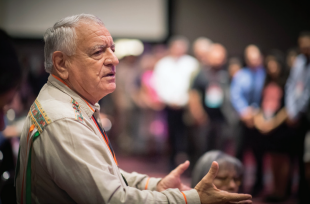 PHIL LANE JR., Yankton Sioux and Chickasaw, has been involved with AISES since 1987 when his father, Phil Sr., a founding member of the Council of Elders, received the Ely S. Parker Award. Phil Jr. is an internationally recognized leader in human, community, and economic development who has spent the past 50 years working with Indigenous peoples across the globe. For 16 years, Lane was associate professor of First Nations Education at the University of Lethbridge in Alberta. Currently, he is chair of the Four Worlds International Institute and Compassion Games International. Lane has received numerous international awards, including the Ally Award from the Center for the Healing of Racism for his 20-year commitment to resolving issues around the abuse of Native children in Canada’s residential schools. Among Lane’s recent efforts is work with tribes to stop the expansion of the Alberta Tar Sands and related pipelines.
PHIL LANE JR., Yankton Sioux and Chickasaw, has been involved with AISES since 1987 when his father, Phil Sr., a founding member of the Council of Elders, received the Ely S. Parker Award. Phil Jr. is an internationally recognized leader in human, community, and economic development who has spent the past 50 years working with Indigenous peoples across the globe. For 16 years, Lane was associate professor of First Nations Education at the University of Lethbridge in Alberta. Currently, he is chair of the Four Worlds International Institute and Compassion Games International. Lane has received numerous international awards, including the Ally Award from the Center for the Healing of Racism for his 20-year commitment to resolving issues around the abuse of Native children in Canada’s residential schools. Among Lane’s recent efforts is work with tribes to stop the expansion of the Alberta Tar Sands and related pipelines.
New Members
Three new members were inducted to the Council of Elders at the 2017 National Conference: Steve and Rose Toehe Darden and Norbert Hill Jr. The Dardens have a long affiliation with AISES, dating back to their college days. Norbert Hill Jr. served the organization for 15 years as executive director and is a former Board of Directors member and the founding publisher of Winds of Change.
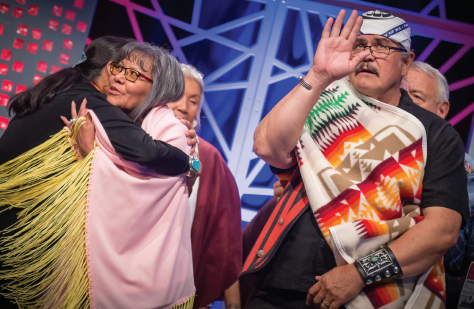 STEVE DARDEN, Navajo and Cheyenne, earned a BS in creative arts management and business administration and is a business owner and traditional practitioner. ROSE TOEHE DARDEN, Navajo and Ute, has a BS in general studies with an emphasis in business administration and psychology, and a master’s in educational psychology and counseling. She has spent her career in educational and workforce development and business management.
STEVE DARDEN, Navajo and Cheyenne, earned a BS in creative arts management and business administration and is a business owner and traditional practitioner. ROSE TOEHE DARDEN, Navajo and Ute, has a BS in general studies with an emphasis in business administration and psychology, and a master’s in educational psychology and counseling. She has spent her career in educational and workforce development and business management.
According to the Dardens, “We aspire to be models of balance — pursuing opportunities for achievement in the Western world while maintaining our cultural integrity — that is, living the values that helped us achieve and bring us into elderhood. We hope to foster traditional knowledge among all members and provide spiritual guidance and support for students, which may be combined with professional counsel.”
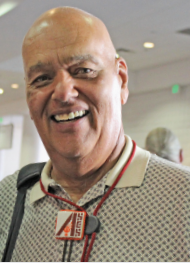 NORBERT HILL JR., Oneida Nation of Wisconsin, has a BS in sociology and anthropology, and an MS in guidance and counseling. Recently retired, he was director of education for the Oneida Nation and former vice president of Green Bay Campus, College of Menominee Nation. “AISES is unique in that it has a Council of Elders to stress the importance of remembering where we come from,” Hill says. “It’s about intergenerational learning. The council is a cultural resource for the students — we are there to provide a sense of community. We serve as a rudder for the organization, reminding members we are Indigenous peoples fi rst; we have an obligation to learn all we can and take that knowledge back to our peoples to improve their lives.”
NORBERT HILL JR., Oneida Nation of Wisconsin, has a BS in sociology and anthropology, and an MS in guidance and counseling. Recently retired, he was director of education for the Oneida Nation and former vice president of Green Bay Campus, College of Menominee Nation. “AISES is unique in that it has a Council of Elders to stress the importance of remembering where we come from,” Hill says. “It’s about intergenerational learning. The council is a cultural resource for the students — we are there to provide a sense of community. We serve as a rudder for the organization, reminding members we are Indigenous peoples fi rst; we have an obligation to learn all we can and take that knowledge back to our peoples to improve their lives.”
Elders make a difference
“Dr. Bret Benally Thompson had a heavy infl uence on me when I fi rst attended a Leadership Summit. He was a great person to talk to about my future career, to confi de in about personal things, and for moral support. I always enjoy learning from Bret about the cultural aspects and how to take care of the sacred objects. His wife, Antoinelle, is just as supportive in all aspects, with a motherly touch to top it o . They are a huge part of my AISES involvement. Also, I always enjoy hearing Dr. May’s stories of his experiences and the hardships he endured to get where he is now, and I seek him out.”
— Cody Kapotak, Yup’ik, is pursuing a BS in civil engineering at the University of Alaska Anchorage.
“The elders have truly become family. They are supportive of my endeavors, and like family should, they let me know when I might be getting off my path. Learning about their childhood, education, experience, and dedication to our people and land has inspired me to be resilient, respectful, and rise to my life purpose as they have. Their knowledge is a gift and their laughter some of the best medicine. I have so much love and respect for them individually, and as a council, for all the work they do for AISES.”
— Ciarra “C” Greene, Nimiipuu and Nez Perce, is pursuing her MS in science education.
“When I first joined AISES I was a little intimidated by the elders. I am so glad that I started speaking with them, because over the years I have gained so much strength and healing by being in their presence. The last few conferences have been especially uplifting for me because I received special blessings and prayers from the elders. Last year I was blessed by Stan and Cecelia Lucero when they ‘adopted’ me and gave me a Laguna name. But all the AISES elders have impacted my life. They remind me to laugh, to be humble, and to love life during good and bad times. They have given me more blessings than they will ever know.”
— Sheila Lopez, Navajo (Diné), is a past member of the Board of Directors.


